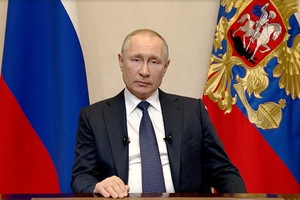US allows Russians under sanctions Zoom and US domain registration
The US Treasury issued a general license (that is, applicable to all market participants) that allowed Russian citizens and companies that fell under US blocking sanctions (SDN list) to freely use American communication web services, including instant messengers, e-mail, Internet browsers , social networks and file storage. it follows from the text of the license that sanctioned persons will be able to use even paid versions of such programs as Zoom (video conferencing), Dropbox (document storage), pay for web hosting, domain name registration (GoDaddy), etc.
“Export or re-export, sale or supply, directly or indirectly, from the United States or by US persons, wherever located, to the Russian Federation of services, software, hardware or technologies that enable communication on the Internet, such as instant messaging, video conferencing, chat and email, social networking, photo, movie and document sharing, browsers, blogs, web hosting and domain name registration services prohibited by Russian Harmful Foreign Activities Sanctions Regulations) are permitted,” the license says.
The license does not only allow the use of DOLLAR correspondent accounts in the interests of Russian banks from the CAPTA list (currently there are only Sberbank and its subsidiaries, later Sberbank also got into SDN), debiting funds from frozen American accounts of the Bank of RUSSIA or the Ministry of Finance and transactions, prohibited by US presidential decrees on the embargo on the import of Russian hydrocarbons and on the EXPORT of dollar bills and luxury goods to Russia. However, these reservations do not apply to persons and organizations that are blocked and included in the SDN list (for example, VTB Bank, VEB.RF state corporation, Sberbank, ALROSA, President Vladimir Putin, Prime Minister Mikhail Mishustin, Foreign Minister Sergei Lavrov, businessmen Alisher Usmanov , Viktor Vekselberg and others).
VTB will transfer foreign assets of clients to other brokers due to sanctions Finance
Why the license for Russia looks more like a Cuban one than an Iranian one
The 1977 US International Emergency Economic Empowerment Act (IEEPA), which imposes all financial and economic sanctions, expressly prohibits restricting personal communication or the export of "information" from the United States, notes the HEAD of the sanctions law and compliance practice of the college. lawyers Pen & Paper Sergey Glandin. In practice, however, the US Treasury still needs to issue licenses authorizing such services and specifying the scope of permitted communications services. Even with such licenses, many American companies prefer to simply block services (for example, in Crimea, Zoom is not available even on a free basis for private use).
Previous similar licenses are for Iran (.pdf), Syria, Crimea (.pdf), Donetsk and Lugansk People's Republics (.pdf), etc. - Operated with the concept of "personal communications" provided to users in these countries/regions for free. The "Russian" license refers to "communications" in general, including those provided on a commercial basis. Another difference is that the US Department of the Treasury allows the supply of equipment necessary for the provision of such communication services to Russia. As Brian O'Toole, a former senior adviser to the sanctions division of the US Treasury Department (OFAC), told RBC, the license can be read quite broadly, covering, for example, the supply of American servers, so that Russian providers ensure the operation of their own (and not American) communication services,
Read on RBC Pro Pro Anti-crisis measures for business:what should the owner do right now Instructions Pro Another opinion:how to listen properly and use it to your advantage Instructions Pro Where to transfer advertisements from closed social networks InstructionsPro Why the ruble is strengthening and what it means in practice Articles Pro Founder of "Teremka":the word “failure” is better for an entrepreneur to forgetwhat will happen to the labor market Articles Pro The world is waiting for a decade-long commodity supercycle.And here's why Articles Pro Companies have resumed their search for top executives:which candidates are now in price ArticlesPromsvyazbank after falling under sanctions began to work in the Crimea Finance
“This general license is similar to the permits for Cuba, where OFAC is essentially saying we allow if the US Department of Commerce allows it,” says O'Toole.
The exceptions to the Cuban sanctions state that, in most cases, the sale to Cuba of American Internet communications services (including web hosting, domain name registration, cloud storage), as well as hardware and software for communication devices, is allowed, if agreed. with US DOC regulations for Cuba (including the export control exemption for personal communication devices).
See also Sobchak responded to an article about Israeli citizenship 00:29
How the US Treasury gave priority to DOC export control rules
O'Toole believes that such a license to Russia, with a broader scope than traditional licenses to countries such as Syria or Iran, is welcome, as it aims to "help ordinary Russian users with normal access to WhatsApp , Signal, or Proton Mail [Encrypted Webmail]." “The collateral damage [to US interests] from the fact that, conditionally, Putin will also be able to use such services (although in practice it is obvious that he will not use them), is justified in the interests of ensuring that the relevant American providers continue to work,” he said. expert.
The text of the US Treasury license emphasizes that it does not exempt US persons from compliance with US Department of Commerce export control requirements. The US Department of Commerce, tightening export restrictions on Russia at the end of February, made an exception for consumer communication devices such as personal computers, modems, mobile phones, and digital cameras. These devices can still be freely shipped to Russia from the United States for individual use by ordinary consumers - but not for the Russian authorities and not for a whole list of officials, including the president, prime minister, deputy prime ministers, federal ministers, State Duma deputies and members of the Federation Council , reported the US Department of Commerce.
UnionPay cards from Russian banks. Will they replace Visa and Mastercard Finance
Despite being licensed by the US Treasury Department, "experience shows that US providers are likely to play it safe as the US and Europe now see Russia as toxic to doing business," warns Glandin.
After the international payment systems Visa and Mastercard left Russia, it became difficult even for ordinary users to pay for foreign services from the country, not to mention people and companies under US sanctions. Nevertheless, such options remain - for example, if you use the UnionPay payment system or pay from your mobile phone account (as in APPLE services).



























































